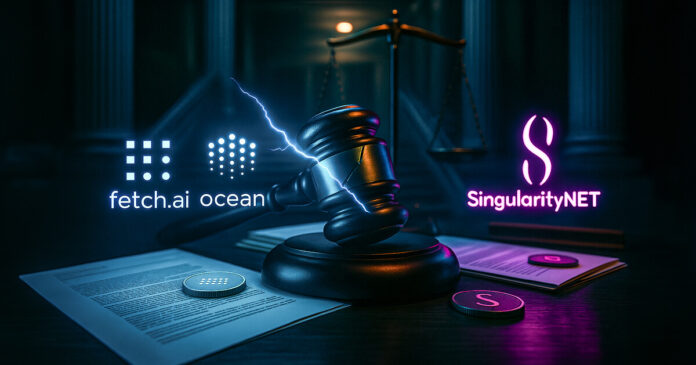The Artificial Superintelligence Alliance, once hailed as the flagship of AI collaboration in crypto, is now crumbling under the weight of internal conflicts and competing interests. This alliance was created to unite Fetch.ai, SingularityNET, and Ocean Protocol in a shared ecosystem, with the goal of accelerating decentralized AI development through token and governance alignment. However, what began as a vision of synergies has evolved into public arguments over control, transparency, and token management.
These tensions have now spilled into the courtroom, with Fetch leading a class action lawsuit that could test not only the future of the alliance but also the idea of DAO autonomy. The lawsuit, filed in the Southern District of New York, alleges that Ocean Protocol and its founders misled the community about OceanDAO’s autonomy. The plaintiffs claim that Ocean misrepresented that hundreds of millions of OCEAN “community” tokens were reserved for DAO rewards, but converted and sold those tokens after joining the Artificial Superintelligence Alliance, thereby reducing the value of FET and undermining the DAO’s stated governance model.
Background of the Dispute
The Artificial Superintelligence Alliance was formed to promote collaboration and innovation in the field of decentralized AI. Fetch.ai, SingularityNET, and Ocean Protocol were the founding members of this alliance, each bringing their unique expertise and technologies to the table. However, the alliance’s progress was hindered by internal conflicts and competing interests, ultimately leading to the lawsuit filed by Fetch.ai.
The lawsuit, “Fetch Compute, Inc., et al. v. Bruce Pon, et al., Case No. 1:25-cv-9210,” was filed on November 4, 2025, and names Ocean Protocol Foundation Ltd., Ocean Expeditions Ltd., OceanDAO, and Ocean co-founders Bruce Pon, Trent McConaghy, and Christina Pon as defendants. The plaintiffs allege that Ocean misrepresented the status of approximately 700 million OCEAN community tokens, which were originally staked for autonomous, rules-based distribution to contributors via smart contracts when Ocean moved to a DAO model.
Key Allegations and Claims
The plaintiffs claim that Ocean transferred the OceanDAO assets to a Cayman Islands company, Ocean Expeditions, in late June, converted OCEAN to FET beginning in early July, liquidated a large portion of the resulting FET in centralized locations, and withdrew from the ASI Alliance in October. K&L Gates partner Ed Dartley, counsel for Fetch.ai and the plaintiff group, stated that “Ocean misled the token community and its merger partners… into believing that 600 million Ocean tokens were reserved for community rewards.” He added that the defendants “reaped millions of dollars that should have gone to the community.”
The Ocean Protocol Foundation denies the claims, stating that “This is a very strange lawsuit that appears to be designed more for circulation on social media than for success in court. OPF will respond vigorously to this lawsuit in due course.” Dr. Ben Goertzel, CEO of SingularityNET and co-founder of the ASI Alliance, commented that “Although I was very unpleasantly surprised by some of Ocean Protocol’s recent actions related to its exit from the ASI Alliance, I prefer to leave the legal side to the lawyers.”
Implications and Next Steps
The case has significant implications for the future of the Artificial Superintelligence Alliance and the concept of DAO autonomy. The plaintiffs seek class certification, compensatory damages, and equitable relief, including rescission and disgorgement. The complaint asks whether a supposedly decentralized DAO was actually controlled by a small group that could move community assets without the consent of token holders, and whether Ocean’s public materials, blog posts, and “vision” documents formed a binding agreement about how community tokens would be used.
The case comes at a time of increasing regulatory and civil scrutiny for token projects that describe themselves as decentralized while maintaining foundation-controlled multisig structures. US authorities and courts have treated DAOs as unincorporated associations if human controllers can be identified. The outcome of this lawsuit will likely have far-reaching consequences for the crypto industry and the development of decentralized AI.
For more information, please visit https://cryptoslate.com/cryptos-flagship-ai-pact-fracture-fetch-sues-ocean-over-263m-fet-community-sales/

